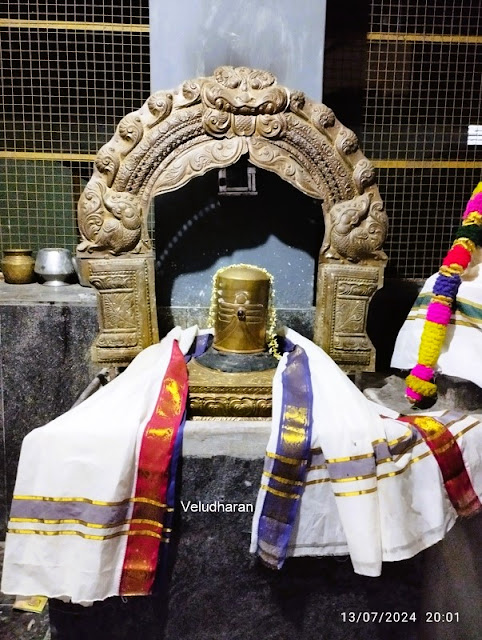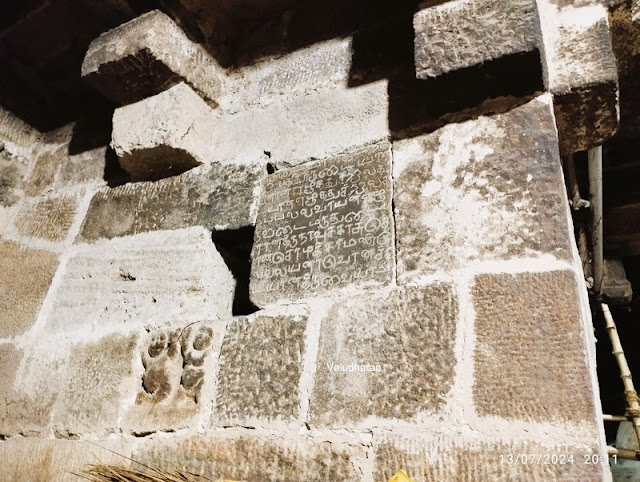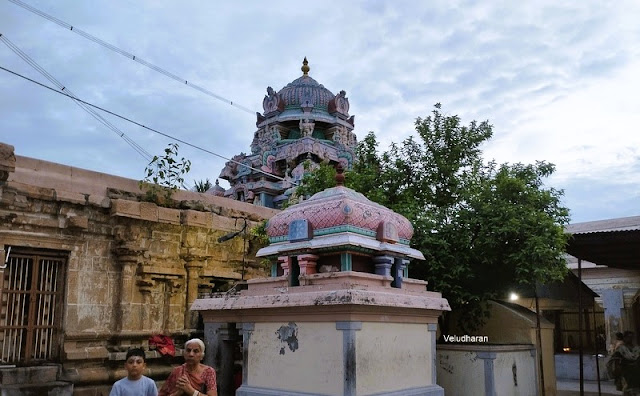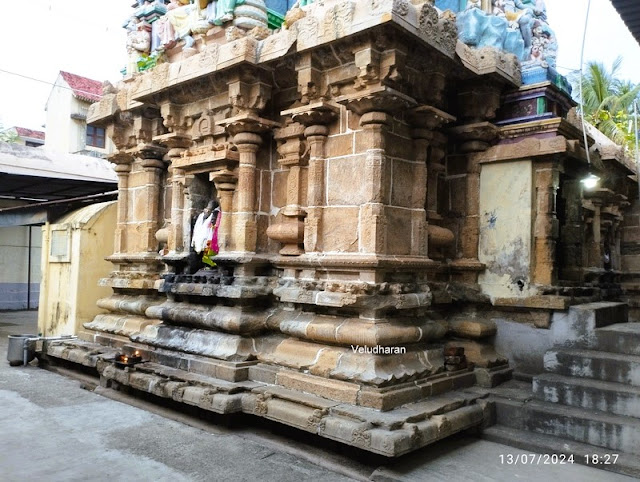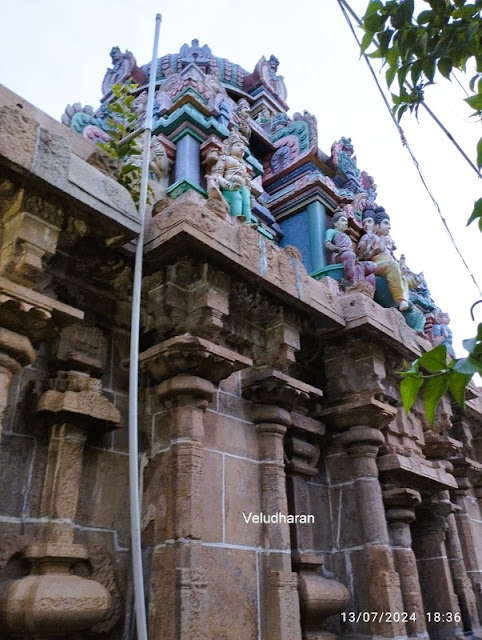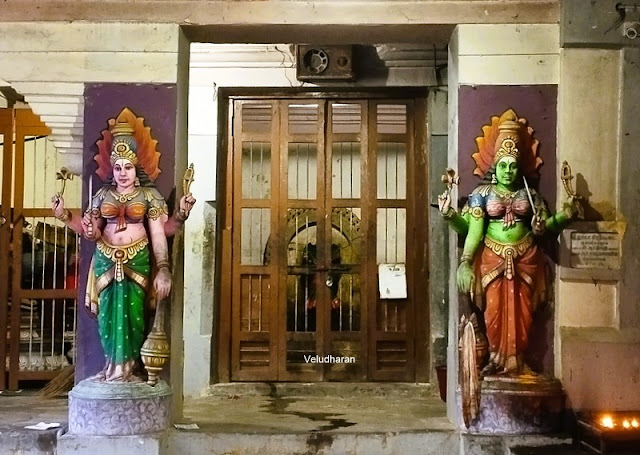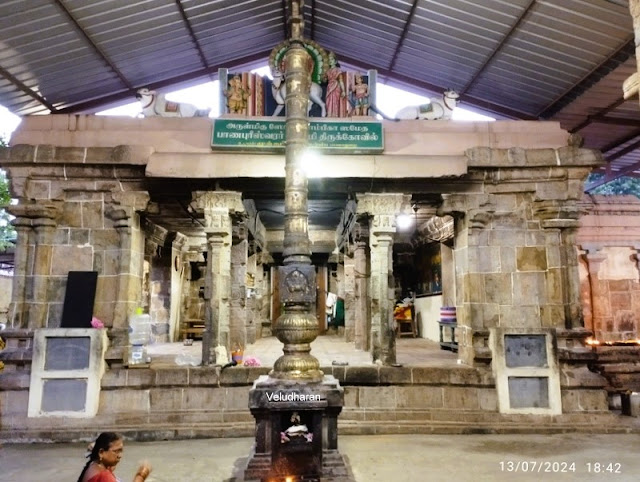The
visit to this Sri Veerabhadra Swamy Temple was a part of the “Shiva, Vishnu and
Amman Temples Visit, in and around Kumbakonam”, on 13th July 2024. This
is one of the Two Veerabhadra Swamy Temples of Kumbakonam, where the main deity is Veerabhadra, which is being maintained by the Veera Saiva mutt of Darasuram.
Also, this is one of the Pancha Krosa Sthalam.
Ottakoothar Jeeva Samadhi
Moolavar : Sri Veerabhadra Swamy
Consort : Sri Badrakaliamman
Some
of the salient features of this temple are….
The
temple faces east with a 5-tier Rajagopuram. Balipaadam, Dwajasthambam, and
Rishabam (Octagonal-shaped mandapam).
Moolavar Sri Veerabhadra is without Dhakshan on a raised platform. There
is another Veerabhadra idol in the ardha mandapam with Dhakshan. In Koshtam
Vinayagar, A man’s idol, Dakshinamurthy, and Brahma.
In
praharam, Nagars, Navagrahas, Bairavar, Ottakoothar (11th Century), Jeeva Samadhi, and Revana Siddhar Jeeva Samadhi (8th Century).
Revana Siddhar Jeeva Samadhi ( 8th Century ).
Sri
Bhadrakaliamman Sannidhi is facing south. Amman is in a standing posture with
abhaya varada hastam.
ARCHITECTURE
The
temple consists of the sanctum sanctorum, antarala, ardha mandapam, and a
metacolour sheet mandapam. The sanctum sanctorum is on a pada bandha adhistanam
with jagathy, vrudha kumudam, and pattikai. The bhitti starts with vedikai. The
pilasters are Vishnu kantha pilasters with square bases, kalasam, kudam, lotus
petals mandi, palakai, and vettu /poomottu pothyal. The prastaram consists of
valapi, kapotam, with nasikudus. The temple was constructed with stone from
adhistanam to prastaram with stone. The superstructure, ie, vimana, was
constructed with Bricks. The Vimanam is of one tala, greevam, and vesara
sigaram. Stucco images of Shiva, Dakshinamurthy, Maha Vishnu, and Brahma are in
the tala and greeva koshtams.
HISTORY
AND INSCRIPTIONS
It
is believed that the temple was built during the Kulothunga Chozha period, and later
received contributions from Vijayanagara Nayakas and Marathas.
This
temple is being maintained by the Veera Saiva Mutt of Dharasuram.
Ottakoothar…
Ottakoothar was born in Tiruverumbur,
and according to some works, is regarded as belonging to the line of Muchukunda
Chakravarti (an ancient-period Chola king, associated with the Maragatha Lingam
story). The prefix Otta (derived from the Tamil Ottam, meaning a wager or bet) is
attached to him due to his competitive spirit. He served as both court poet and
minister, in the time of Vikrama Chola, Kulothunga Chola II, and Rajaraja Chola
II, on all three of whom he has written Ula poems (about the honor of the kings
and their interaction with the subjects). The village of Koothanur – famous for
the Saraswati temple – is named for Ottakoothar, to whom the village had been
granted, and he has sung poems on Saraswati there. Ottakoothar attained
jeeva samadhi at this very temple.
It
is believed that the Ottakoothar and the Senguntha Mudaliars are the lineage of Veerabagu.
வீரவாகு
வழியினர்:
'தேவியுமை
பாதச் சிலம்பில்வரு வீரியர்கள் சிறுதே ருருட்டி யருளே'
'சிவ கயிலாய
பரம்பரையா ரென்னும் செங்குந்தரே'
'குமரச் செட்டிக்
கிளையநற் செட்டிகளாகும் இச்செங்குந்தர்'
LEGENDS
As
per the legend, celestial deities, Devas, are invited for the Yaga conducted by
Daksha, but Shiva was not invited. Without the permission of Shiva,
Dhatchiyaini went to the Yaga sala, and enquired of Dhaksha, why Shiva was not
invited and due share also not paid. When Dhaksha refused again, Dhatchiyaini cursed Dhaksha and the celestial Deities and Devas and jumped into the Yaga
Kund. After knowing this, Shiva created Veerabhadra from his hair and sent Dhaksha’s
place along with Bhadrakaliamman to destroy the Yaga. Veerabhadra Killed
Dhaksha. To the request, Dhaksha was made alive, with a Goat’s head. The idol
of Veerabhadra in the ardha mandapa has Dhaksha in a worshipping posture, but
Dhaksha will not be there in the Main deity’s image.
POOJAS
AND CELEBRATIONS
Three
times pooja will be done, and no intermittent arathi will be shown. On
Thursdays, Special Abishekam and Aradhana will be done between 17.00 hrs to
18.00 hrs.
This
Temple is a Nivarthi sthalam for mutakku dosha, Pithru dosha. Also, this temple
is one of the Pancha Krosa Sthalam.
TEMPLE
TIMINGS
The
temple will be kept open from 07.00 hrs to 11.00 hrs, and from 17.00 hrs to 20.30
hrs.
CONTACT
DETAILS
The
mobile number +919245418708 may be contacted for further details.
HOW
TO REACH
This
Sri Veerabhadhara Swamy Temple at Darasuram is about a km from the Popular Sri
Airavateesvara Temple.
This
temple is about 4.6 km from Kumbakonam Bus Stand, 4.5 km from Kumbakonam
Railway Station, 36 km from Mayiladuthurai, and 40 km from Thanjavur.
The nearest
Railway Station is Kumbakonam.
LOCATION
OF THE TEMPLE: CLICK HERE
---
OM SHIVAYA NAMA ---










